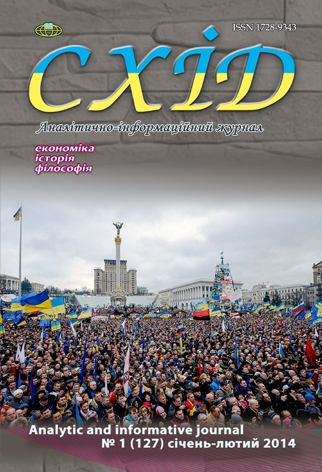Budgeting on different levels and consolidated information drafting in holding companies
DOI:
https://doi.org/10.21847/1728-9343.2014.1(127).23071Keywords:
budgeting, consolidation, Group Company, enterprises, financial and economic prospectAbstract
The efficiency of management system functioning become as the key factor of corporate groups competitiveness. The budgeting process is one of the shaping elements of economical control system in the structure of corporate consolidated companies. There fore the development of methodological base for forming the complex of budgets and consolidate information compilation at the enterprises of integrated group companies is the actual scientific task for the еconomic development.
The article includes methodological components of budgeting, discovers the opportunities of budgeting tools to use hem in the conditions of multilevel organizational structure of Group Company and for concluding consolidate in formation of corporate groups. The approach based on according methods of budgeting and corporately linked assets of the group company, principles of formation and hierarchy model of budgeting process control system has been offered. As the result of the approach the preconditions to optimize the economic control of all the subordinate constituents of the integrated structure are formed in the group company.
The basic methods of budgeting in the preparation of budgets at various levels has been grounded, which allows us to analyze all cost items and identify potential savings, consider the specific initiatives of the structural elements of the group, to determine the optimal level of gross expenditure and the priorities of the use of limited financial resources without direct binding to the historical data. A methodology for budgeting enterprises in the holding company, which is to develop an integrated model of the budget process that will lead to greater economic and financial efficiency and financial sustainability of the organization, has been offered.
Downloads
References
Бородушко И. В. Стратегическое планирование и контроллинг / И. В. Бородушко, Э. К. Васильева. - СПб. : Питер, 2006. - 192 с.
Верескун М. Эффективное управление как фактор обеспечения стратегии конкурентоспособности крупных промышленных объединений / М. Верескун, В. Колосок, Е. Дроботина // Вестник ПГТУ. - Мариуполь : ДВНЗ "ПДТУ", 2011. - Вып. 22. - C. 86-92. - (Сер.: Экономические науки).
Wetherbel J. C. Zero based budgeting in the planning process [Електронний ресурс] / James C. Wetherbel, John R. Montanari // Strategic Management Journal. - Режим доступу : http://onlinelibrary.wiley.com/doi/10.1002/smj.4250020102/references.
Хан Дж. Ен. Недостатки традиционного бюджетного управления (бюджетирования) / Дж. Ен Хан // Финансовый и инвестиционный анализ предприятия [Електронний ресурс]. - Режим доступу : http://www.beintrend.ru.
Колосок В. Аспекти стратегічного управління в промислових холдингах / В. Колосок // Business and Management-2012. - Вільнюс : Vilnius Gediminas Technical University, 2012. - V. II. - С. 1113-1118.
Колосок В. М. Методологія розвитку стратегічного управління великих промислових підприємств : [монографія] / В. М. Колосок. - Маріуполь : ДВНЗ "Приазовський державний технічний університет", 2012. - 247 с.
Майталь Ш. Экономика для менеджеров: десять важных инструментов для руководителей / Ш. Майталь ; [пер. с англ.]. - М. : Дело, 1996. - 196 с.
Речлин Р. Эффективное бюджетирование бизнеса: пошаговое руководство с формами / Р. Речлин. - СПб. : Интернет-трейдинг, 2006. - 569 c.
Самочкин В. Н. Гибкое развитие предприятия. Анализ и планирование / В. Н. Самочкин. - М. : Дело, 1998. - С. 37.
Щиборщ К. В. Бюджетирование деятельности промышленных предприятий / К. В. Щиборщ. - [2-е изд., перераб. и доп.]. - М. : Изд-во "Дело и Сервис", 2004 - 592 с.
REFERENCES
Borodushko I. V., Vasilyeva E. К. (2006), Strategic planning and controlling, Piter, St. Petersburg, p. 192 (rus).
Vereskun M., Kolosok V., Drobotina Ye. (2011), Herald Azov State Technical University, № 22, pp. 86-92 (rus).
Wetherbel James C., Montanari John R. (2006), Zero based budgeting in the planning process, available at: http://onlinelibrary.wiley.com/doi/10.1002/smj.4250020102/references (ukr).
Khan John Ian, The drawbacks of traditional budget management (budgeting). Financial and investment analysis of the enterprise. available at: http://www.beintrend.ru (rus).
Kolosok V. (2012), Business and Management - 2012, Vilnius Gediminas Technical University, Vilnius, V. II, pp. 1113-1118 (ukr).
Kolosok V. М. (2012), The methodology of large industrial enterprises strategic management development, monograph, Pryazovskyy State Technical University, Mariupol, p. 247 (ukr).
Maytal S. (1996), Economy for managers: ten important instruments for leaders, Delo, Moscow, p. 196. (rus).
Rechlin R. (2006), Effective business budgeting: step-by-step guide with forms, St. Petersburg, p. 569 (rus).
Samochkin V. N. (1998), Enterprise flexible development. Analysis and planning, Delo, Moscow, p. 37 (rus).
Shchiborshch К. V. (2004), The budgeting of industrial enterprises, 2-nd ed., reworked and complemented, Moscow, p. 592 (rus).
Downloads
Published
How to Cite
Issue
Section
License
Copyright (c) 2014 Valeriya Kolosok, Nadiia Chepaykina

This work is licensed under a Creative Commons Attribution-NonCommercial-NoDerivatives 4.0 International License.
1. Authors bear responsibility for the accuracy of facts, quotations, numbers and names used.
2. Manuscripts are not sent back.
3. The publisher does not always agree with the authors' opinion.
4. The authors reserve the right to authorship of the work and pass the first publication right of this work to the journal under the terms of a Creative Commons Attribution-NonCommercial-NoDerivatives 4.0 International License. This license allows others to distribute (copy) the published work for non-commercial purposes, provided there is mandatory attribution to its authors and a link to the first publication in our journal.
5. The authors have the right to conclude separate supplement agreements that relate to non-exclusive work distribution in the form in which it has been published by the journal (for example, to upload the work to the online storage of the journal or publish it as part of a monograph), provided that the reference to the first publication of the work in this journal is included.

